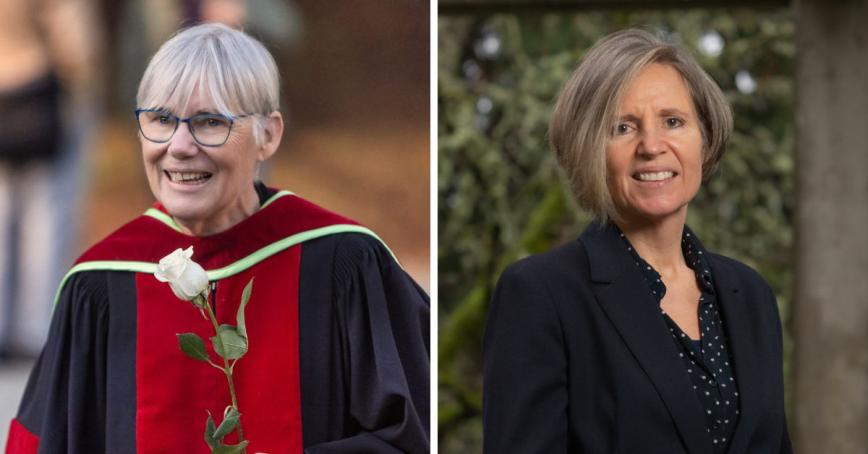RRU profs empower people to reduce dementia risk with new course
Topics
Featured
Share online

Learn more about RRU’s School of Leadership Studies.
Reducing incidences of dementia among older adults will take learning and leadership — and that’s where Associate Professor Kathy Bishop and Associate Faculty Wendy Young come in.
The two Royal Roads University Leadership Studies faculty are part of a team of five that was recently awarded $50,000 in Centre for Aging and Brain Health Innovation Ignite Funding for its Pathways to Cognitive Wellness project. Over the next 10 months, they and their co-investigators are developing a prototype for an innovative 12-week course to help people address and reduce their own risks for developing dementia.
“The purpose of it is really to imagine a different future, one where we've significantly reduced rates of dementia and transformed the lives of older adults and their families,” says Bishop, who is also program head for RRU’s Master of Arts in Leadership (executive leadership specialization) and Graduate Certificate in Values-based Leadership.
“A starting place is, really, what do we in the western world currently offer people?” says Young. “First of all, we don't offer them much in terms of the risk reduction of dementia.”
Young notes that the medical journal The Lancet reported in 2017 that more than a third of global dementia cases were potentially preventable; last year, it hiked that number to 45 per cent.
“For me,” Bishop says, “what's exciting about it from a leadership perspective is that we are looking at leading the way to do something in a different way, to make a significant positive change in the lives of people through transformative education.
“We'll look at some of those sustainable lifestyle changes for cognitive wellness, like whole-food, plant-predominant nutrition, physical activity, stress management, resilience, sleep hygiene, social connections, environmental factors, land-based healing, embodied wellness,” she says. “Right now, we're in the process of taking all sorts of theory, research and practice, and really pulling that together to make an innovative curriculum.”
The Pathways to Cognitive Wellness project focuses on developing a culturally sensitive curriculum grounded in Indigenous Knowledge, western lifestyle medicine principles and evidence-based practices to support cognitive health and wellness in older adults.
Bishop (principal investigator) and Young (project coordinator) are collaborating with a project team that includes: Kim Haxton, a Traditional Knowledge Holder in Indigenous protective factors; Dr. Jasdeep Saluja, an internal medicine specialist; and Dr. Alex Henri-Bhargava of the Manning Cognitive Health Initiative, a clinical associate professor of medicine (neurology) at UBC and a neurologist with Island Health.
As they develop the prototype program, they will engage a focus group examining the delivery of cognitive wellness education.
“There are some real possibilities here,” says Bishop. “And I think at this point in our world, we need more possibilities and some hope in terms of how we can function better as human beings and function better together.”
Young again references The Lancet’s figures, saying that the fact many people don’t realize they can reduce their own risk factors for dementias “seems like a tragedy in terms of knowledge translation.”
“So many people think it's a given that it's part of the aging to develop dementia,” she says. “And it's not.”